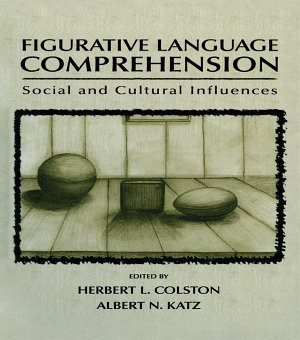Figurative Language Comprehension: Social and Cultural Influences
Herbert L. Colston · Albert N. Katz
ธ.ค. 2004 · Routledge
4.0star
1 รีวิวreport
eBook
360
หน้า
family_home
มีสิทธิ์
info
reportคะแนนและรีวิวไม่ได้รับการตรวจสอบยืนยัน ดูข้อมูลเพิ่มเติม
เกี่ยวกับ eBook เล่มนี้
Figurative language, such as verbal irony, metaphor, hyperbole, idioms, and other forms is an increasingly important subfield within the empirical study of language comprehension and use. Figurative Language Comprehension: Social and Cultural Influences is an edited scholarly book that ties together recent research concerning the social and cultural influences on figurative language cognition. These influences include gender, cultural differences, economic status, and inter-group effects, among others. The effects these influences have on people's use, comprehension, and even processing of figurative language, comprise the main theme of this volume. No other book offers such a look at the social and cultural influences on a whole family of figurative forms at several levels of cognition.
This volume is of great interest to scholars and professionals in the disciplines of social and cognitive psychology, psycholinguistics, and second language acquisition, as well as cognitive and other fields of linguistics where scholars have interests in pragmatics, metaphor, symbol, discourse, and narrative. Some knowledge of the empirical and experimental methods used in language research, as well as some familiarity with theories underlying the use, comprehension, and processing of figurative language would be helpful to readers of this book.
This volume is of great interest to scholars and professionals in the disciplines of social and cognitive psychology, psycholinguistics, and second language acquisition, as well as cognitive and other fields of linguistics where scholars have interests in pragmatics, metaphor, symbol, discourse, and narrative. Some knowledge of the empirical and experimental methods used in language research, as well as some familiarity with theories underlying the use, comprehension, and processing of figurative language would be helpful to readers of this book.
การให้คะแนนและรีวิว
4.0
1 รีวิว
เกี่ยวกับผู้แต่ง
Herbert L. Colston, Albert N. Katz
ให้คะแนน eBook นี้
แสดงความเห็นของคุณให้เรารับรู้
ข้อมูลในการอ่าน
สมาร์ทโฟนและแท็บเล็ต
ติดตั้งแอป Google Play Books สำหรับ Android และ iPad/iPhone แอปจะซิงค์โดยอัตโนมัติกับบัญชีของคุณ และช่วยให้คุณอ่านแบบออนไลน์หรือออฟไลน์ได้ทุกที่
แล็ปท็อปและคอมพิวเตอร์
คุณฟังหนังสือเสียงที่ซื้อจาก Google Play โดยใช้เว็บเบราว์เซอร์ในคอมพิวเตอร์ได้
eReader และอุปกรณ์อื่นๆ
หากต้องการอ่านบนอุปกรณ์ e-ink เช่น Kobo eReader คุณจะต้องดาวน์โหลดและโอนไฟล์ไปยังอุปกรณ์ของคุณ โปรดทำตามวิธีการอย่างละเอียดในศูนย์ช่วยเหลือเพื่อโอนไฟล์ไปยัง eReader ที่รองรับ






